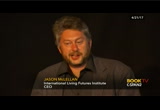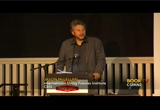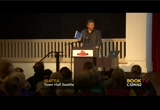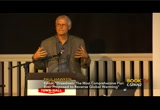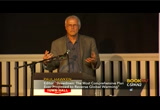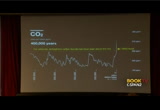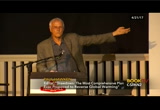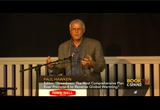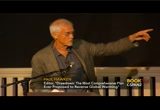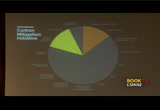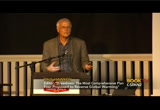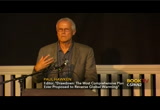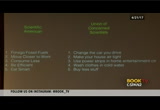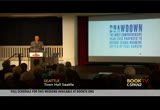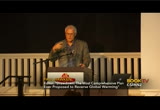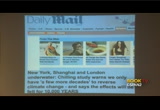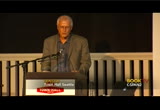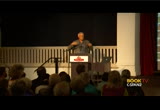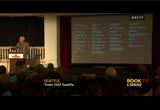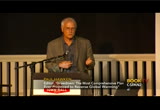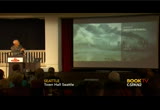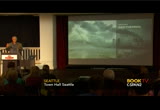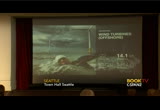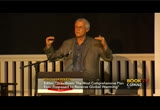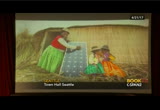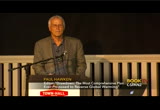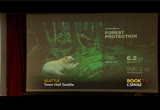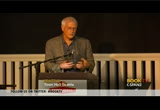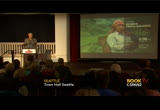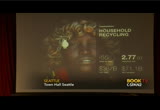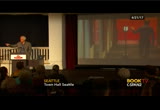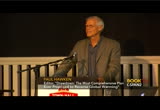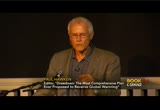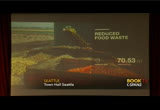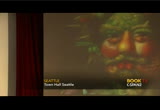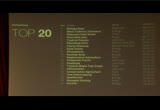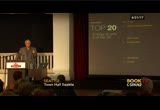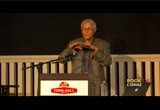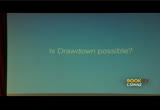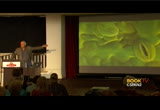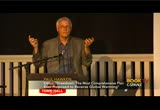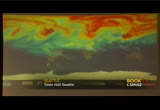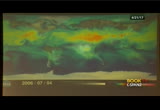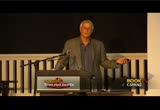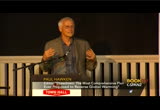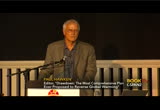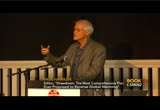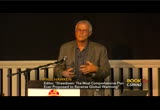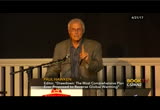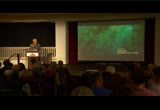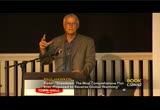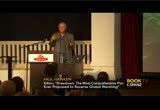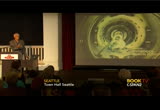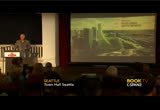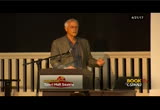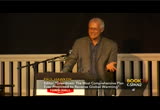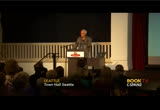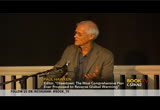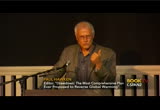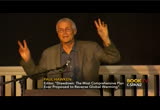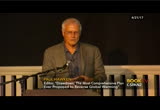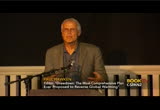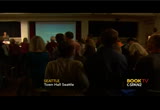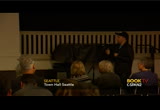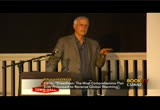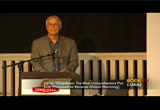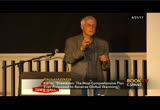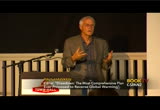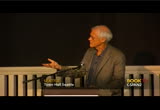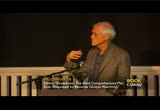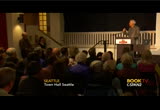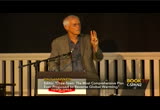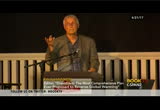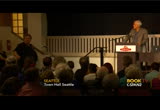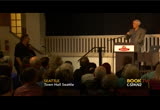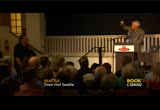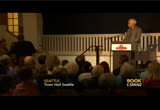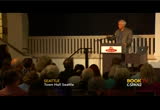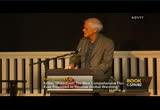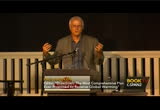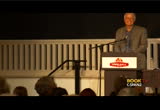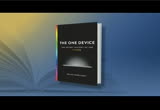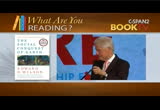tv Paul Hawken on Project Drawdown CSPAN July 9, 2017 8:03am-9:32am EDT
8:03 am
thank you very much. >> you won't find that cheap anywhere else. >> booktv is on twitter and facebook, and we want to hear from you. tweet us twitter.com/booktv or post a comment on our facebook page facebook.com/booktv. >> how is everyone doing? are you excited? this is amazing, right? andre dornier has read all his books, i hope, correct? so i'm professional troublemaker for those who don't know me, people that i worked with a few
8:04 am
years know that is certainly true and as a great example of that i open my big mouth a few months ago and said paul, i should be introducing you. suddenly i am not introducing paul. [laughing] so that was not planned but the truth is it's a great honor and a real pleasure to do so. i've known paul for quite some time, and he knows this but i'd like to try to bear sin. he doesn't and bears easily enough i found that paul is truly one of my heroes in life and has them or to influence my thinking that just about anyone on the planet, and you know some of people that i've worked with as well. so paul, you've just been an amazing part of my life, and thank you for everything that you done for all of us in the green building, in the environmental world so thank you, paul. i had an opportunity when the ecology of commerce came out to have some time back then with
8:05 am
paul, and he as a general influenced my thinking from that moment forward. there's a lot of people that can say the same, and i'm sure many of you here have had that same response when you've read his words, his clarity, his ability to look at the world very carefully and present it back and reflect back, ideas in a way that make you think and make you challenge assumptions, which is what we needed. i'm just so excited about his new book. not just because on page 188 i mentioned which is really cool. [laughing] but 188, go back and look there. >> but really this is the right book at the right time, and it is one of those books that you shouldn't just read. you should buy multiple copies. i'm not getting any royalties just to be clear, but you should be giving this to everybody that
8:06 am
you can. we need more and more emphasis on fax these days, not alternate fax but real facts. we need more data. we need more help, right? and we need more solutions to problems, not just problems. and paul and his huge team of people that have contributed have brought this amazing piece of work to bear. so with that i would like to welcome paul to the stage. please give him a huge round of applause. [applause] >> thank you, jason. thanks for coming out. it is a beautiful day in seattle. i understand it's gone tomorrow.
8:07 am
i have spoken your before and i just love to speak in places where people have spoken, if you know what i mean. it's like playing in -- praying in a place for people praye to r meditate were people of meditative. there something in the building, in the fabric of the place that's different than something new and different. drawdown, drawdown means that first point in time, greenhouse gases speak and go down on a year-to-year basis. that's the definition. how did drawdown? start? is starting in 2001 when a red the summary third assessment. and like the ones that preceded it it was more pessimistic as a follow to get more pessimistic the reason for that isn't so much the things that change the it's there's less suppression,
8:08 am
because there are consensus report but there's no such thing as scientific consensus. science is evidentiary. it's not about consensus. the consensus is in the saudi arabians and the chinese and the russians and the venezuelans oppressing the projection of the science of the fantastic group of people that comprise the igcc. i looked at it, had a big problem. i was educated in the '70s. it's not difficult to understand actually. and so later in that year i will show you slide that there was data presented for the solution and everybody was very excited about it. and this is what captured my attention at that time. actually the first slide i want
8:09 am
to show you before that is really where we are and where we are as that straight line. and so oftentimes which it is language about climate change, about medication, reduction, stabilization, about net zero. you hear this language. well, that dotted line no human being of any shape medical form even as a primary form has existed on the earth when the levels of co2 were about that dotted line. so anybody who says they know it's going to happen about the dotted line is guessing, may be inaccurate guess or good signs but it is total speculation. we don't know. in 2001 even more so now when people are talking about, this is 2001 easily, just, just a little bit higher now in 2017. the point being is that we are so far beyond anything that this
8:10 am
pc to ever encounter or lived within. and that peak to the left, the first peak to the left-right there, that's it. 125,000 years ago. it was 285, okay, in terms of co2. at the time the hippopotamus and crocodiles in the delta. the sea level is 20 feet to 30 feet higher in the ocean. there were crocodiles and alligators in alaska and lyons and giraffes in germany. it was a very different climate regime, and that was 285. we are at 402. so at that time and especially now it's really important to name the goal. you don't name the goal, you're not going to probably hit it. if you don't know the goal, if you don't understand the goal, and the goal is drawdown. so when you use words like,
8:11 am
words are used like mitigation reduction and slowing down, it's really like thelma and louise in slow motion. if you're going over clip and useful down you go over the cliff more slowly, okay next you're going down the wrong road, you slow down, still the wrong road. the language about how we should address this problem has been very as they say, what's the word? we need -- weak kneed in the really hopeful. someone said to me what an ambitious goal. i said no, i'm not ambitious. you guys are really, you are an ambitious. you don't know, it's like this is not ambitious. this is about preserving civilization. this is about creating the conditions in which music, art, society, culture, knowledge can grow, virgin, blossom. this is for us. this is the perfect period of
8:12 am
climatic stability. there's no stability on that line anyway. no such thing. so what i saw there was this, the carbon mitigation initiative came out with the famous global wages. these are eight wedges 1,000,000,001 billion tons eache emissions by 2050. stabilize, in other words, peak. i looked at them and these are the 15 solutions that comprise those eight wedges. i looked at them like this, which is all those are great. those solutions that only can be done by large corporations. i mean large conservative corporations like energy and utility and car companies. all 11 of those, and at the time though solution were deeply underwater financially.
8:13 am
that is to say, if the even more conservative board of directors of those corporations said great, let's do it, they would be sued for additional responsibility and is corporations what a loss their balance sheet. so in other words, what? that's why i started to get concerned. this is solutions? i don't get it. i don't get it. and furthermore what can you do? drive less. you. that's it. what can cities do? cities, towns, villages, neighborhoods, small businesses, farmers, grasslands, they are not there. the people who weren't there. this is all about things. so i went around at time and talk to friends at nrdc and
8:14 am
sierra club and said we should make a list, figure out what can we do? we don't know what he can do. i'm just like you. what can i do? what can we do? figure out how to solve this. it's a great idea. carbon impact and what would happen in 30 years. it's impossible. maybe it's not. who knows? what would it cost? basic great idea. we don't have the expertise. i don't either. and so i kept asking others to do it and i would did it and i forgot about it. i forgot about until 2012 when an article came out in rolling stones and then the "new york times." i had friends company and say literally quote it's game over. it's game over. i tried. i worked hard. it's futile.
8:15 am
my response, i'm going, moved to british columbia. it's like as if that was a solution. i thought maybe it's the other way around. maybe it's game on. when it's that level of frankly this case terror. if you google the top ten solutions to global warming or climate change right now, these are two esteemed scientific organizations, these are the top five. don't forget to put that power strip in your entertainment center. it's like, i mean, the solutions that are proffered out there are proverbs, not solutions, like love your mother. good idea. unit, don't forget the power
8:16 am
strip. good idea. wash it in cold water. change delightful. what's happened is the communication about climate change and global warming has been like this is what you can do and okay, and it's just like it was all on your shoulders. the implication was that if you didn't do it and you feel guilty and you feel bad about yourself, but these are so cute. [laughing] forego fossil fuels. try it for 24 hours. try it. can't eat food that was shipped in. you can't, you know, think about it. it's very difficult to do. move closer to work. like you can afford that. [laughing] i'm moving to downtown seattle. i'm rich. so this is the book, "drawdown:
8:17 am
the most comprehensive plan ever proposed to reverse global warming" let me explain the first part of the title, ever propose. the reason we can say the most comprehensive point everest because no one has ever propose a plan. [laughing] we had the high grad and we still have it. we can say the most brilliant, artistic, nuance, whatever in the title and be true. because nothing to compare it with, which is sort of astonishingly think about it. i'll get back to that. and so that's the book, and this is what it looks like conceptually. shows that point, that inflection point is drawdown and that's the goal. we want to go the other way. what's affecting our perception about this is how we get the news, and how we get the news is really in headlines can usually with a sense of threat of doom and gloom.
8:18 am
it may not be true in this room but certainly the greater mass of people in the united states, in the world get the news this way. i love this one. because as you can see over here, you have wife smashes has been overhead and keep the mummified in sheet for years. like if you're on level of importance. here's mark smith, they guide congress who always says climate change is a conspiracy. this is a good one, which is severe consequences and the real reason so many women have just been so much time getting ready. i mean, so would you present information, besides it's actually good on this headline. they are accurate.
8:19 am
plenty of things you never knew, you could do with coca-cola. thethey're doing the right thins with coca-cola. [laughing] they are putting it down the toilet. and this one, the bottom as is the effects will be felt for 10,000 years. that's a game over headline if i ever saw one. a very good paper and the only thing i can say about the paper is it's not a farmer or a gardener, and then so drawdown. who are we? we are not me. we had no money. i went to a foundation and said we want to do this thing and they said show was when you get done. i need the money now. anyway, so i borrowed money from my retirement plan and gave, might have been given to me to write a book by an italian philanthropist. so we started that we had no money to hire a really great
8:20 am
staff, and a big staff that is. we put out the call around the world to academics and students for research fellows and we were overwhelmed with the most amazing resumes, people, i've one the award, and white house fellow, i'm a rhodes scholar, better resume 20 sixth and i have now. and these astonishing people all over the world, and this is who they are. not all of them that's a lot of them. almost half are women, 40%, half at phds. they all have advanced degrees. they are from 22 countries, six continents and this is "drawdown." this is who did the research. you can stand up. [applause] >> and i thought if we're going to do this, we have to be a coalition. there has to be a collaboration
8:21 am
it has to be as talking to us we talking to we. not think i've got a plan. we've got one in the white house. that's the worst thing you want is a white male with a plan. that's just not going to cut it. so we needed man and women with an idea and with a heart and compassion and with great scientific bites. and we also got 128 advisors. these are some of them. along with 128 advisors we have about 40 outside expert science reviewers. what we did is just collect all the solutions. we're going to map, metal and much of the top 100 solutions. that was a self-imposed mandate. we started gathering the ball and going to them, looking, checking, doing back of the napkin stuff. one by one we accumulated this list that's in the book. some of them dropped out when we
8:22 am
got deeper into didn't and we had at some, but basically it came down to 80 that remodeled and 20 which we call coming attractions, they are valid scientific but there's really not sufficient data in terms of the carbon of the financial impact. we modeled both the carbon impact and the financial. what's the cost, the return, the net operating savings, et cetera. so we did both, and on the carbon we only used peer-reviewed science. that's the only info we use. not anecdotal signs, not internet sites to we use real science. and so, and we also did in such a way that we always chose a more conservative number. when we had a choice on foot conservative. the criticism we got for what you going to see from our advisors and from outside
8:23 am
scientific experts as far as you too conservative them it's too low. it's better, cheaper. there's were in fact. that's exactly the criticism we want. that was our purpose. we want people to say it's that you fluffed it up or anything like that. so what do we do? we just do math. that's what we do. the math has been done and what's going to happen if we don't act but it has not been done on the top solutions to global warming. anan anthropologist want to fige out why we didn't do that. i don't know. i have no explanation, don't ask me in the q&a. i don't know. i spent 16, well, up to now 16 years, but 13 years asking other people. good idea, you know.
8:24 am
okay. [laughing] so what you see, and the first one is the right by 2050, and that is, in fact. there's only two things you could do about that with respect to global warming. stop putting greenhouses gases up there, conservation efficiency or substitution. or sequestration, which is photosynthesis, grasslands,, forest lands and bring back to earth, bring it back on where it came from. this is a measurement in 2050. this is the number of gigatons which is a billion tons with 16.6 billion tons of co2 that is reduced, avoided or sequestered, depending on the solution. this is the net cost to the net cost is the cost compared to what you would do if you were not going to do this. it would be combined gas, coal plant, to many of which country
8:25 am
where, and what does cost more or less? in this case it actually cost much less. the last figure is over the lifetime to 2050 how much money would it cost. we to make money or lose money? you would save $1.02 trillion. and so with this go -- this is improved rice production. rice is a big source of methane, and if you change the production methodology, costs nothing. take the water off the pad in the middle and let it be, anaerobic. you increase increase productiva better yield, spatial plan for the park, actually cost less, produce more. produces methane production by 50%. as you can see the cost is one farmer walking across the stilted next one. that's it. there is zero cost to the solution. but it saves a lot of money. this is offshore wind. this is not photoshop.
8:26 am
this is in norfolk and it's a triathlete going by the megawatt wind turbines. i'll get back to wind. coastal wetlands. this is nuclear. we got criticize by greenpeace, how could you report nuclear on that? it's a good question. a fair question to we put it in because our mandate was a map, measure model the top 100 solutions of global warming. that doesn't mean we are advocates, doesn't mean there's not solutions in your that have spillover effect. as a mean solutions that are called regret solutions. most of them are no regrets which mean we should do if there's no climate science whatsoever. so many benefits in terms of peace and security and health and well-being and jobs. but some of them are the other way around. this is certainly one of them. but the reason we did is because
8:27 am
we had to maintain objectivity. if we start saying i don't like the solution, leave it out, or this is a good one, my friends are doing it, then whole book and all the book would be completely suspect and thrown out. so that's why it's included. i happen to think it's the most ridiculous way people have ever invented a way to boil water. that's all it does is boil water. let's be real. there's a magic to this. this is a rooftop solar -- what we try to do with the imagery is to try to open up, get rid of the coal chaise around these things. it's not a drone shot of the land in the suburbs with solar panels and shingled roast. it's like how inspiring is that? here is a woman in lake titicaca with her two daughters living on a strong island which will sink if you doesn't replace the straw every three months. she was using kerosene at night
8:28 am
on a strong island. and now she has a solar panel. no wonder she is greening. of course, -- smiling. her daughters can learn and read at night. we want to make sure we could look at the solutions in a broader canvas, not just as inanimate objects that are sold and have a renewable as an energy source but have many more the net. this is the number ten solution to this is one of my favorites called educating girls. this is number six, way up there. you know the drill. i'm sure you do from girls rising, and the girl effect and so much work has been done in this area, which is what happens if a girl isn't taken out of school in sixth grade, pre-puberty and made off by her
8:29 am
culture or family or for whatever reason. and what happens is she gets to choose to be a woman on her own terms instead of being imposed upon, and her rate of reproduction goes five average and higher in certain countries. and if she is allowed to go to tenth, 11th, 12th grade and shsheathing is a very different person, and the average reproduction age is below replacement rate, and she, because of education, earns more, puts more resources into her children. her sons and daughters do the same thing i as she did in terms of their family planning, and the impact is significant. i want to get back to this because it's really important to this is forest protection. doesn't rank high because they are there already. we're not going to make too many primary forests but you see in the bottom the amount of carbon
8:30 am
protected. you can put in pure carbon. it's very, very important. this is rain forest protection and restoration. the number five solution. this is regenerative agriculture. again, very important, and this is managed grazing or holistic resource managing or quotation grazing, lots of words for it. this is also one, and i want to say this in terms of land use. one of the things you see on internet is people sort of making very outlandish, even on ted talks by the way, very claim for this and other land-use solutions like we can reverse a lot of the co2 back to industrial levels from ten years, things like that. it's giving, the scientists call the soul, giving it a bad name
8:31 am
to make these outrageous claims. one of the things were able to do is take land-use, because you can only model something, we couldn't model it unless their science, and like there's no science for agroforestry but there is for multi-strata, for civil past year. we can all those and so it ended up breaking land-use in a very specific categories. and then measuring them very actively as opposed to just guessing, which we didn't want to do. this is women smallholders. almost 80% of the food in a what is produced by smallholders, another name for a small farm. 43% of those small farmers are women. the other 20% is big gag, and big gag was sad to think of a don't support them let them kill our butterflies and our soil and poisonous xml we're going to starve and yet what to produces
8:32 am
corn and soy and palm oil and sugar mainly for pigs and cows and trans fats and diabetes. they don't feed us at all. this i get summer they feed as is simply not true. they feed us. this is where -- [shouting] yeah. so in this case what's the solution? the solution is that she gets the same seed, tools and information that men get. that's all it is, and what happens is she produces a lot more food and impact on force and so forth is less and nutrition gets better. thithis is a cool dude in berlin his electric bike. i know. it's so cool here nutrient management which is just a runoff from the fertilizers we don't really need. this one, can you guess what this is? thank you, household recycling.
8:33 am
this is a woman in ethiopia, and they built a bridge across from her village and they put a bar therefore the workers and so the women go across the river every day and pick up a bottle caps and make these beautiful headdresses. now they sell them in boutiques in france. [laughing] beautiful, beautiful women. this went as a transport solution. i should have more transport, bus, train, car, i should but more in you. this is the one transport solution we do have, and the sky, he works at price waterhouse coopers, the former account for the oscars. [laughing] and he's waiting to the sky on the ipad this guide is little mini segue scooter, scooting around the office. he is in toronto, the guy who is in waiting to that guy was on the ipad is in prosperity can go to toronto, log on and scoot around the office and call on people. he can come in here and be in
8:34 am
the back of the room, any meetings and he could come up to the mic and ask a question. that would be a little kinky. but you know what i'm saying. what we are shipping around world as protoplasm instead of ideas. we want peoples ideas for shipping this whole big bag of protoplasm. it's a solution. we were so surprised when the numbers came out. we didn't get them into 12 weeks ago. so we prepared the book, designed the book and have it all camera ready, digital ready copy except the numbers. we wanted to work on the numbers until the last second before penguin ripped it out of our clutches. because they will never be right, the numbers. it's endless, and so when we got to them we're like oh my god, so surprised and went to recheck in this and be sure and yes, and everything was right. so interesting because i had a friend at the time who i've
8:35 am
known for years and she went to paris, cop21 and said we're working -- she said i going? i'm working. i said, i make a bet that is nobody in paris at cop21, the conference of the parties that knows the top ten solutions. in any order. just write them down to give them a piece of paper and i said i that no one knows. we don't know, we know that. called me back just with british the numbers and said how are you doing? and i said great, we have the numbers. i said -- i won't say her name because you know vernon actually. and i said, she has been in climate for 30 years. she's written books, she's been a grantee, a grantor. she knows climate. cold. and i said we were so surprised
8:36 am
at the top five solutions. said, i don't think anybody in the world knows the top five solutions to global warming. i'm talking about al gore, ban ki-moon, you name it. i said we did note, thus her daughter but i don't think anybody knows. i bet these two guys -- how old are you? [inaudible] i bet you both can name the top five teams in the nba right now. right? i mean, come on, you know. this is not, you know, of course, it's like -- [laughing] here we are 4 40 years into the biggest crisis civilization has ever faced and nobody can name the top five solutions. i don't know what to say. what's surprising is is this. the number three solution is reducing food waste. didn't see that coming. once we saw the numbers we can work backwards and say yeah,
8:37 am
yeah, yeah, it all adds up. it added up. number four solution, plant rich diet. yeah, now, doesn't mean vegan or vegetarian, and lets you choose to. it's fine. no problem. what it means is reducing protein in which nations the level where you actually are healthy. that's all. which is not 80 g or 100 g grams a day. that is not healthy. doesn't matter what you think you're getting our what diet you were on. it's not healthy. but it also includes raising the caloric and protein content for people who have insufficient nourishment in the world. so we didn't just reduce the west or the wealthier countries. we increase caloric and protein content in those countries, and still came out to number four.
8:38 am
so what surprises is that the food sector is bigger than energy. again, we look down, let's look at this carefully, and you would think, what's the solution to global warming? solar, solar when, donate so much meat. that's it. then you have a hall pass to the 22nd century. not a chance, not true. what we've been hearing over and over and over again, those are critically important solutions but they are all important. i'm just saying the idea there's just a few things we can do and where okay, you know. you just hear it all the time, that mantra, and here's the top 20, i'll go back, sorry. syllable past year, number nine. the whole thing is too new? who knew? that was the mantra.
8:39 am
but we've done the math, rigorously but it's been reviewed and we reviewed and study at its own peer-reviewed list. every one of the solutions is scaling and one of the solutions is can do practical hands on happening right now. there are not things we could do it only. they are all scaling can we understand them very, very well. make that very clear. and food or a are the top 20. again, okay. energy is five of the top 20 and jeff solar and wind. now, you don't have wind, the wind is 22, but he could add 20 to all chores when an onshore, which is number two, you put them together and they are
8:40 am
number one, not refrigerant management what you saw on the other slide. however, this is the top solution, standalone solution, which were actually sort of disappointed to find out not that it's not a great solution, it's just that the gases and the refrigeration and ac have a global warming potential that's thousands of times greater than co2. so it doesn't take much for these, and this is well in place. this is one i want you to look at. here's educating girls can look at the next one after, its family planning. that number is 100 19.2 billion tons of avoided emissions in 2050. that's the real number. we separated because the pathway in terms of educating girls versus family-planning clinic for women, such as reproductive choices in support for her health and her children help are
8:41 am
very, very different pathways. they end up in the same thing. there's no bright line between the impact. you can't say this comes from that and this comes from that. we just divided evenly right down the middle. the point being at them both up. the number one solution to reversing global warming is empowering girls and women. [applause] >> again, when's the last time you heard that? [laughing] and as i said recently in oakland it's not a panel. it's a woman. we need solar panels, too, but -- so remember this was the carbon mitigation initiative. this is what it looks like, this is what it really looks like. this is what the solutions to global warming look like, something you would see in nature, not something you would see on an excel chart.
8:42 am
so this one is drawdown possible. thesthese are in every leaf andg in the world. if you hold a handful of these in your head, there's 100 might have been in your hand and they are the key to drawdown. when stomata are open to releasing their moisture but also eating co2 for breakfast lunch and dinner. that's be open to get that to make sugar to survive to live, to grow, to create, to put the sugar done in the roots. when they are closed, obviously they are safe, but they are also come can't because all the time because they will star. if you plan to those closed, it will die. if it's always open it will die. so obviously stomata do
8:43 am
something else which is open close, open close. look out to any landscape, in place in the world, writer as good one. look at how many things you see that are dying in front of you. not very many. trees and shrubs and perennials and grasses are all living. they are all being made alive by stomata. recently there were computer models and he discovered they seem to have memory about temperature going back many days. they can detect temperature. they can detect humidity. they can hear the course of the birds. they can detect how much moisture is in the plant, the leaves, and the needles or the trunk, whatever it is. they can detect the motion in the roots. they can detect the moisture in the soil around the with all those calculations, temperature, time of day, everything, they open and close and open and close.
8:44 am
basically what i'm saying here is that they are freaking brilliant. unbelievably brilliant. all those plans are alive, doing their thing, you know? can you imagine it the republican party ran -- [laughing] the plant world? boom, gone. it's extraordinary intelligence and this is what i, i hope this works, it does. and this is just, many of you have seen this as a mass assimilation of carbon emissions. the orange and the darker red and the vermillion are really meant to symbolize concentrations of co2 in the atmosphere. and so what you see is what happens over a span of years. what you see a northern hemisphere where most people are and wha where it is winter is yu
8:45 am
can see, this is winter for most of humanity. what most of humanity does in the winter is trying to keep warm and turn the heater on the car and in their home. where using a lot of power and we're still working industrially and putting gases up in the atmosphere and making things. and that goes and gets worse and worse and worse, and it peaks in may. the co2 levels peak, but just in may you start to see this little blue with the things, and then they become a stronger and more pronounced, and they keep doing that through june, july, august, september. so what's happening? co2 is being sequestered by the trees leasing out. you see them beautifully right now in seattle, the grasses, the
8:46 am
crops. you don't see much smaller than now, right? the fact is that every year we drawdown the seven ppm. drawdown happens every year. significantly so it goes up and it goes down. the earth is breathing. so it's not only possible, it's happening. so when we talk about drawdown we're talking about shifting. with some equilibrium so that the emissions are not as great as the capacity of the earth to bring carbon.com on an annual basis. it's not ambitious. it's right in front of us. and what we learned from a our research is that we can do it in 30 years, with what we know. and so again on this book, that
8:47 am
title, the other word plan, this was written by stanford intern. he worked at penguin. my editor sent to me and i said no, no, no. not a plan. i told you that. i left it on my desk, not the cover but just the first. the most comprehensive plan ever proposed reverse global warming. and a look at it and i thought he's right actually. it is a plan. he saw it. where i was hung up is the idea that we made a plan, our staff and our fellows. we did make a plan. we found it. there is a plan. it's us. we know what to do. we are on the case. we are not numbskulls. we are not stupid, right? we actually care and we thinking about our children, the future, displays, this extraordinary home we call earth, and we are on it.
8:48 am
and every one of the solutions is scaling back of one of the solutions is a place run the world not in every country but around the world and so forth. this is humana's collective wisdom at work. it didn't come from paris. it didn't come from some hierarchy. it came from this sort of mysterious way that human beings have of being wise in a collective way that they may not understand as an individual, and so that's -- this is the front part of the book. she's our client. we had a big picture. that's our client and this is my language, just briefly, before going to do this were to change how we talk about it, you know? if you use words like decarbonization and negative emissions, i mean, you just telling to be ready to her talking to that they don't know anything, you do and they really
8:49 am
are not part of the problem and solution. the language about climate science is guaranteed to alienate people who don't know the lingo and the jargon. it's not necessary, you don't have to use of it if you understand something you can say it in words that everybody can understand. so the other thing about language, and there are many things, by the other thing about language is w when to stop using the metaphors of war. i mean, combat climate change. fighting climate change. stopping climate change. slashing emissions. the war against -- i mean, because that, those verbs are the birds of dualism. that's the verb whether something other other than you because like it's not me. i'm going to fight that thing. it's the enemy.
8:50 am
let's stop it. like, that's the thinking that cause the problem. exactly the thinking that cause the problem. thinking that there's an ocean we can stick plastic into. there's an atmosphere we can put our carbon into. and so we can't solve it with the same mindset that created it. and furthermore, that might fit alienates and device. you take those headlines we saw before, gloom, threat, do. then you take that rhetoric and can you take the "scientific american," power strips and move closer to work and wash in cold water, okay. so now you have a bit of guilt and shame, mix it all together and stir well, you have indifference, numbness, right? the nile. like i can't, i don't know what to do. -- denial. that's not a way to come together. it's just not away. we know that. so really the book also tries to
8:51 am
use different by which to engage you. you opened it up and go what's that? when you saw the woman, you look in the book for rooftop solar, there's a picture there of the first solar panel in 1884 put on a rooftop in new york city, and we talk about it, the caption says in 1882 was the first coal-fired electrical generating plant in the united states. we wondered which was first. it took a while. it's not like read this at your, by the way, there are polar bears drowning and there's a big hurricane coming and glaciers are melting like crazy. it's true. but it's not a way to enter into the problem of solving the problem. it's not the way in. and it alienates people, and every second you received 119 pieces in preparation in your
8:52 am
brain, every second, and 40 of them you process and about six or seven to actually do something about. so if the information is about we are screwed, you are going to get a population that votes for you know who. this is just a quick one just to show, this is a part of the dashboard of a model, just a part of the dashboard to get some sense of the complexity. david montgomery is coming with essays from pope francis and others. david and his wife, throughout the book. they are great. we also have coming attractions, and i'll close with this. and these are solutions that are scientifically valid. as i said earlier there's a economic or scientific data to
8:53 am
model them so we don't model then. they are just above the horizon or just below the horizon, but what it shows is that the solutions we model are not the only tools that we have. it's not our total toolset going for the next 30 years. shhumanity is brilliant, incredible and with one of them in this book. when doing another book called 60 more coming attractions. these are just, we just regaled because people are amazing and the sky, brian, he has assessed at 337 and a glaciologist when you fly over greenland to your every year, he said thousands of them, and then two years later his life over and he said welcome they are more like melted like snow actually. then two years later his lubricant and it was like a lake, a really, really big lake. lake. he got it.
8:54 am
how fast the ice sheet was melting. he invented this. this is big frames -- saltwater doesn't break it down for some reason. these pumps the basic are actually rising and fall of the water and to go down to bring up the cold nutrient laden waters below which are now being stopped by d.c. bubbles causing 97% of the heat from increased water is going into the ocean, not the land. 97% is going there. and so a natural circulation is slowing down and stopping. so brings up the cold nutrient laden water and you have been plankton, algae, kelp, cedar fish, the whole ecosystem comes in weeks. owing takes weeks before -- they
8:55 am
did what in hawaii and i think in six weeks they had a whale shark. they are vegetarian and the wanted the kelp. he's talking about restoring the productivity of the oceans. 99% of the marine, of the oceans -- are marines deserts. there's no life at all. we are finding out, it's cool. put it that way. it was 17 years because they know that fusion is for government dig big holes and the grant and take big bulldozers full of money and bury it. scientists say it's 30 years off but it is coming. the founder, 17 years and stealth are they raised $500 million, just raise $265 million last month, people who are close to technology
8:56 am
obviously think it's going to work. i say it's 20 months. one more milestone to go. i followed them for 11 years as a journalist. i think at one more milestone to go which is not the most one. this is base load power. it's. if a reactor goes down, shuts off, you can start with a honda generator. it's actually a very cool technology. this is repopulating the mammoth step. it's about bringing animals back to the sub arctic circle. we wiped them add as hunters. wenders grass and horses and mocks fox, when a stark and everything in the temperature of the sun goes down to decrease in pay which protects them from a prospect so permafrost protection solution is just brilliant. valerie have a part.
8:57 am
this is building with wood. the highest building, would building now is going up, a bank in portland, 12 stories. these buildings are more fireproof than steel and concrete buildings. i know, it's counterintuitive. big impact. this is a last winter i needed this one, it could be called the cow but solution, to but member the joke a panda bear walks into a bar. this is a cow walks onto a beach. what it is a farmer and oregon notice, he's a dairy farmer and most farms and prince edward island under the ocean when you think about it. he noted that cows eat seaweed and produce more milk sweet asked a local printer you should talk to this scientist. why? what's going on? he said well, because methane production is so inefficient and
8:58 am
so therefore it's suppressing methane production. and so they did an experiment. face fed lots of seaweed to a few of the cows and the plastic bags on their head and measured the emissions per account. for science. [laughing] it turned out it worked but a lot of kelp, and practical, expensive but instructive. so the scientists heard about someone in greenslade was doing the same work ethic i together. he went down to queen's landing and to try to find something that would mimic what the kelp is doing, seaweed. they found something called -- this rich native hawaiian sea. delicious actually. if you feed it at a 2% level to sheep or goats or cows or cattle, methane production is reduced 70-90%.
8:59 am
it's so cool, and how it was discovered. remember that guy, they guys going to put these frames under the water and grow, those two are working together and raising money to grow it. what it does is kelp suppresses carver about the any plant below, number one, is that you d acidify the ocean. [applause] and you produce protein. as you produce fish, right? and lastly is a business case? i love the question or i don't get it from you but i do get it from business people, business case. i'll take the business case for this and you tell me that this is great for destroying the ocean and clearcutting or tropical forest, poisoning everything else in between.
9:00 am
this question itself is interesting because it sort of implies that this is is just about money. it turns out that when we add the numbers, ice at 12 weeks ago we had the total button, make sure we don't double count, it's a complex model, and it turns out that if we institute the solution over the next 30 years we will save $78 trillion. save money. in other words, what's the cost? the cost is zero. there's no cost at all. ..
9:01 am
when i was up there that i think i was going to die. yes, absolutely. that's what you need to know going in because it is absolutely going to happen to you. it does not cooperate. he didn't say that. i'm saying that. at some point, everything is going to go south on you him you are going to say this is how it's all going to end. so, you can either accept that and that's all it is. and you do the math.
9:02 am
you saw another and you saw the next one in the next one and if you saw enough problems, you get to go home. that's what this is about. let's go home. let's not waste a minute thinking that we can't do it or that someone else is going to do it for us. or that we need somebody at the white house who understands it. we would like that, but we do not need it. to support, to enlist, to engage, to implement these and many other solutions. remember the pie chart for shows all those little tiny solutions, there's no names they are so tiny. note that in order to achieve
9:03 am
drive down, you need those as much as you need the big ones. this idea we focus on the big ones, yeah, for sure. there is no small solution. is there small people? is there a lesser species, lesser stars? that thinking is the thinking that columnist okasan the big one. all of them together. they're extremely important, so it's a matter of the ricin may, do it, help there, figure it out. how does this relate to politics? i don't know. we'll see. but we do know one thing and that is the commonwealth of nations, secretary general, the former attorney general of the u.k. from dominica, force of
9:04 am
nature, unbelievable has adopted draw down as the template to reverse global warming and institute economic philosophy regeneration for office emissions in the commonwealth. that is almost one third of humanity and one forth of landmass. she stepped up to and that is for real and that's happening in the research we do from now on. [applause] i just want to say we can do this. and so, in e-mail, there's two ways to look at it. global warming and happy mean to you. they did it. i wasn't involved with that. i didn't make the decision.
9:05 am
let's see them. you know, there are bad people and am really upset about it and i'm the obviously. the truth preposition is a dangerous proposition . this is happening for us. this is a gift. this is an offering. this is payback from the only home we know in that achiness to transform everything we do and we imagine it can make a far kinder, more generous, compassionate, beautiful project world than the one we have today and that's what this is about. thank you so much. [applause]
9:06 am
[applause] >> at evening, everyone could run everyone could run in the south income house manager here at townhall. we have about 10 or 15 minutes, so if you can come you keep your questions brief and in the form of a question so we can get as possible. thank you. >> i guess i am first. thank you for the work you are doing. it is uplifting in a way few climate change talks i've been to have been. thank you for that. i appreciated your focus on the use of language that doesn't polarize and i'm curious seattle, where preachers to the choir. we'll voted for not the other guy. if you wanted to excite people
9:07 am
to the opportunity of addressing this, how would your talk the different and what kind of adjustments do you have for that in the organization working with people across the aisle to address this work. thanks. >> that's an interesting question. i wouldn't change much at all actually. i think i may show this -- thank you so much, jason. i don't know if i should share this video are not. this video -- the new ceo came in two years ago and have been working for years and years but the sustainer of development in a 20-year-old cole zero. 91% during terms of fossil fuels. so they are there and they needed a new 20 year goal.
9:08 am
passed away five years ago in the cfo became cto. and then they found someone named jay gould and jay was a republican. and a big supporter. i heard he didn't really want to meet us. janine and myself were the cream part and we're a little concerned about meeting him as well. you know, this is being filmed. i can't show this if it's on cnn. i don't know what to do about that. can you turn it off? no, not cnn, but c-span. the reason is because of the
9:09 am
licensing problem. >> can you show it at intermission? >> thank you very much. a brief intermission. are you off now? i want to do it now. it is my presentation. you can't start and stop? then i can't answer your question the way i want to. i'll show it to you afterwards. the point being is what we did and i can set it up as each one of us talked about what we are doing and we work with government, which corporation and so forth. they really impress them in a sense of the breadth of scope of what all these people, how they are reaching out to the world and influencing and the impact they are having. info, let's watch that when the
9:10 am
camera goes off. i want you to know when you see it, he wrote it. he created it and that dallas in that dallas is not something you would say the same. he tweaked me no say in who is this epa that doesn't get climate science and so forth. and so i just have a very strong faith in people that if you create the spaciousness for people, they can come into this. but if you are right, then you're making it wrong. we don't say we are right. we say in the book nothing in this book is right because about the future. so you can do it yourself and the methodology, talking to us come a say us come to say and what do we know? this is the better shots so far.
9:11 am
because it's the first one that i hope somebody beats us and does it better. this is what we need. i'm sorry. you are next. >> thank you. these solutions are all technological, scientific, quantifiable. we can also imagine a pie chart of qualitative reduction of sexism, increasing social justice, reduction of believe that the world is going to end soon. but they don't care about the future. how do we fold those in with the measurable quantifiable, technological solution. >> it's a really good question. people ask also why you sent private pricing or cap-and-trade in the solution or the policy
9:12 am
that actually enables every solution and accelerates every solution. one of the most interesting solutions that is not there is peace. seriously. what it takes to support the standing military or inaction around the world are staggering and the impact is staggering. he put all that out in measure to the trauma it and health impacts of long-term impacts a mean, it goes on and on and we couldn't measure it. there are things, behavior. reducing behavior and technology. in this case it is behavior we think is natural and in a sense not allowed people to behave the way they would otherwise.
9:13 am
so there are behavioral solutions in here. but yes, we wanted to do something that was measurably accurate and if we couldn't measure it, it doesn't mean it's not important. the most important thing we can change is actually our thinking. that's the number one solution because like byron katie says, it's a dangerous neighborhood. don't go there alone. the way we see the world and then we project that out to the world itself. those things you're talking about and those qualities or lack of qualities really come from our minds. and so, each of us as an individual has a responsibility to attend to our minds in prayer, meditation, you know, so
9:14 am
many ways to do that. anyway, thank you so much for that point. >> thank you, mr. hawkins. i look forward to reading your book, but i see one problem already and that is a bizarre book. i am wondering, would you mind to reduce up to 45 minutes. i'll even wear kappa phi have to. >> you can do whatever you want. if the publisher doesn't know about it because it is copyrighted. the thing about government agencies, better to ask for forgiveness than permission. >> i have your book in the background. but i do want to say, books don't sell. they do so. a lot of people approached us.
9:15 am
this is the third day the book is out. last night was the second emergency presentation. [applause] there's 40,000 copies in print. this is the second emergency printing. they are running out of book. so, i think the reason for that, though, and i agree with you it is a book. all the limitations they are in. i am not sure because how would i know. people are buying that, looking at it and then buying a bunch of them and giving other people. i don't know all of you, how often do you buy a book and give it to others? i am a reader, i love books i often tell people did you read this? it's a wonderful book. every so often i read a book
9:16 am
like andrea wolf's book. i buy it and give it to them. you should really read this and i'm going to make you guilty if you don't. i think that is what is happening with this book. people are so relieved that they're something they're engaged in with respect to the climate and global warming that doesn't am somebody out, that opens up their heart and ideas and imagination. yeah, thank you. >> we have time left for just these last few questions. >> thanks for being here. i don't need a microphone. i've got a pretty loud voice. can you all hear me back there? use the mic? testing, hello. does that work? >> i don't know with your voice. i can't tell. >> my name is andre turner. there were some students down
9:17 am
here and i had to reach her book along with the students. we did the natural capitalism is really quite interesting. something i keep seeing in communications that was key to this whole issue. i keep seeing we need the free dirty. we need to bring down to two a.d., preindustrial age. what makes the two a.d. or the 350 the key point? by the feedback loops? >> know, those numbers are the high numbers of the hall of fame comes the last 10,000 years. it is interesting, often times when i went to an audience the first question i would ask is how many people here don't believe in global warming and climate change and nobody would raise their hand. i would say it's okay. nobody raised their hand.
9:18 am
and then i said it's a trick question. everybody should have raised their hand because it's not about a leaf. but the karl rove question that was planted by the republicans to make people who understood science and were concerned about it to look like true believers and the republicans look like the same object to judicious people. we are not believers. and so, the believers are those people because what they believe is the climatic relative climatic stability to produce civilization as we know it, the last 10,000 years is going to continue to persist for centuries ahead. is not one shred of data to support that belief. they are the true believers. not us. we are the skeptics and we are skeptical that there's anything that supports those views. and so, that is, as you saw in
9:19 am
maths first chart was the high in the last 125,000 years and it came back up their starting in the 1800 then would pass it in the 20th century, et cetera. so i think what they are saying, the absolute maximum might be tolerable and not completely everything he killed her. as i said, there is no real science to support that contention unless you get back under. what we do know is once you have the 20 year lag. it's got momentum and so forth. so even if we do achieve drawdown in 2045 or 2015, were we actually start to get going. we are in for a really interesting ride.
9:20 am
thank you you one more question. >> thank you. my name is kathy. i've been working on that for a long time. i want to echo how wonderful it is to have a resource that is the solution focused because it is a tough deal. they have us engage because of dissent or lack of hope in solution. i am curious along those lines if you thought about ways, highlighting all the solutions, are there mechanisms for the average person to somehow beyond individual things like i can affect my diet, make it more plant-based, but it still hard for someone in seattle to affect the sole pasture. is that there mechanisms for individuals that have some capacity to financially contribute a rather ways that she can highlight those on your website so there are ways people can help create these?
9:21 am
>> the website is work in progress. the numbers are there. the ranking is they are. in the notes are up now. there's about 2000 notes in about two dozen references that go into the content. and they are going to. then what goes up as the methodology. how did they figure that one out. what was the methodology? and then there's two things called educated -- i want to know more about this and then we are going to point to ngos, institutions or literature or websites or movies or documentaries, that will help a person learn more. activate is you want to do something about it, here are the organizations, institutions,
9:22 am
companies in some cases that are active in this area. and so people go there and determine what it is they want to do. the most important thing is for people to look at it and see where they resonate, like this make sense to me or may -- that is an area where they can be effective. so it depends on each person. everybody says with the call of action? what should i do? i have no idea what you should do. so i answer the question you should run. the "wizard of oz" question. you figure out what you should do. you know that. i don't know that. what i can do is provide the
9:23 am
information, the basis that will help expand the possibilities and choices for you if you want it. if you don't, that is fine, too. another thing is we are all innocent and then when we know something, then we make a choice. that's all there is to it. and we just can't see each other any other way because it takes away from who we are when we see somebody in a way that is lesser than not. we do that for ourselves. it's not fun. granted the most incredible opportunity that any generation has ever had. and it's all about re-imagination. don't go away because when the cameras turn on -- don't stand up and go. c-span, thank you so much.
9:24 am
and thank you. [applause] >> someone like steve jobs can come and sell this product and forever be associated with it when that is just a shade of the story. you story. you certainly have done, have a lot to do with it. the truth is even the iphone in so far as it was developed at apple never would've happened without scores of people working around the clock. >> part of the story is the iphone was born as the software interaction paradigm was born sort of behind steve jobs back. this crew of guys like i documented the bloke started
9:25 am
basically experimenting. it was freewheeling research. it was fun, wild kind of stuff. they had these crazy projectors they were using to house different projects together in what would become the iphone. >> former president bill clinton recently shared his thoughts on what he calls the most important political book of the last decade. >> you know what the exhibit is that the clinton presidential center right now? extreme bugs. you know what my staff gave me for christmas last year? two, not one, two and farms so i can have one on my desk at the presidential library and one in my office in harlem. why? because i am always telling the that the most important
9:26 am
political book that nobody read or write for a political book in the last 10 years that would've made us all much healthier acid this is his ear wilson, a social conquest, which is i think less than 250 pages long and is a microbiologist. he first taught me the combined weight of all the ants on earth is greater than the combined weight of all the people on earth. that is quite a number of an -- ants. why am i telling you this? here's the conclusion of the book. the conclusion is that of all of the species that have ever inhabited our earth, and we know there are hundreds of thousands of them, right? they are just sadly disappearing now the most rapid rate in
9:27 am
10,000 years. he says the most successful species that ever lived if you define success as we have repeated chances to be wiped out, but they failed. here we are. the most successful species are ants, termites, bees and people. not the biggest, not the strongest. and he says, what do they have in common? these of all the species that ever lived are the greatest cooperators. they found ways to work together to solve common problems and build stronger features. andy says to people in the greatest cooperators, but a great curse, we have a conscious -- a conscience and a consciousness and we know it.
9:28 am
so it makes us eric and then we think we are smarter than we are, so we tend to slice and dice ourselves but in ways that in the end threat our ability to escape when we are in existence that can challenge. this climate change things give me a cake. no one doubts the question because it's numerically verifiable to more than 90% of the scientists say this is an existential threat to our planet. so now, the new position as i'm not saying they're wrong, but they might be wrong. i'm just saying we had the coldest march in new york in 917 years. i was pleading for global warming to come back. look, i get it. we could make all these jokes. you name me one other threat.
9:29 am
name me one threat that you wouldn't take seriously if you thought the odds of doing this for more than 90% better than the odds of doing that. there's say 100% chance your child will survive a crash unless the car completely collapses. 5% of people say that's crazy. just throw the kid in the back seat and let it roll around. nobody would do that, right? that is what we are doing on climate change. during the kid in the back seat and letting them roll around.
9:31 am
>> chief david brown, what was your day like july 7, 2016? how did it start? >> is started as a normal day and the chaotic work of policing their city where you have scheduled protesters who had planned as part of a national protest day for a very large kind of static events that would be in a park at her downtown area. that is not unusual in the climate of policing today. we have planned for it to be someg
156 Views
IN COLLECTIONS
CSPAN2 Television Archive
Television Archive  Television Archive News Search Service
Television Archive News Search Service 
Uploaded by TV Archive on

 Live Music Archive
Live Music Archive Librivox Free Audio
Librivox Free Audio Metropolitan Museum
Metropolitan Museum Cleveland Museum of Art
Cleveland Museum of Art Internet Arcade
Internet Arcade Console Living Room
Console Living Room Books to Borrow
Books to Borrow Open Library
Open Library TV News
TV News Understanding 9/11
Understanding 9/11
